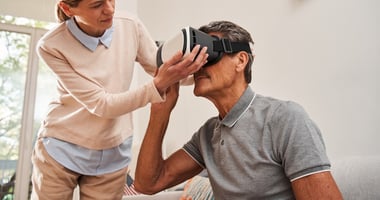Avatar-Guided Virtual Reality Therapy Found to Reduce Fear of Heights
 |
“Immersive virtual reality therapies that do not need a therapist have the potential to dramatically increase access to psychological interventions,” said lead author Daniel Freeman, Ph.D., of the University of Oxford in a press release. “We need a greater number of skilled therapists, not fewer, but to meet the large demand for mental health treatment, we also require powerful technological solutions.”
For this study, 100 people with clinically diagnosed fear of heights, or acrophobia, using DSM-5 criteria were divided into two groups: one participated in the VR coaching program; the other received no treatment. All participants scored higher than 29 on the Heights Interpretation Questionnaire (HIQ), which the researchers considered as the threshold indicating a moderate fear of heights.
The VR therapy involved six 30-minute sessions over two weeks. In the first session, the virtual coach provided background information about acrophobia and how to treat it from a cognitive perspective to develop memories of safety that counteract fear associations.
The remaining sessions had the participants tour a virtual 10-story office complex and take part in activities to break down their fears while the coach provided empathic encouragement, repeated key learning points, and sought feedback on whether the participant felt safer than before. As the program progressed, the activities became more challenging, starting with simple tasks like watching a safety barrier gradually lower over the edge of a drop and then moving on to more difficult tasks like walking out on a high platform.
At the end of the study, the VR participants had an average reduction of 24.5 points on their HIQ scores compared with a 1.2-point reduction among the controls. At the two-week follow-up, 34 of the 49 VR participants had HIQ scores of 29 or lower. No adverse side effects were reported, and 44 of the 49 participants completed all six sessions.
To read more about VR, see the Psychiatric News article “Virtual Reality May Soon Become Clinical Reality in Psychosis Care.”
(image: PeopleImages/iStock)





